Video
youtube
Transform Your Emotional Baggage in 90 minutes | Complimentary Session w...
Schedule your complimentary session here https://calendly.com/selfworthsam/complimentary
0 notes
Text
I Changed My Mind About Imposter Syndrome. Here’s Why.
Author: Self Worth Sam, Imposter Syndrome Expert, Professional Speaker & Trained Demartini Method Facilitator

I used to think imposter syndrome was when a person doubted their intelligence, skill and achievements. However, now I realize the problem goes deeper. The inability to internalize achievements and accept evidence of competency derives from the incredible power we all have to construct and completely believe a mental self-image and self-identity, even one that defies and distorts reality, and observable facts. Such an untapped power of the mind ought to be studied and cultivated. Imagine the power it could give a person. In this article Self Worth Sam will share with you why he changed his mind about Imposter Syndrome and why.
The current understanding of imposter syndrome is that an individual, usually a high achiever with plenty of evidence of success, intelligence, skill and competency, is unable to take credit for these very things. Additionally, such people fear being exposed as a fraud, a fake and an imposter for being out of their depth, and for having fooled everyone regarding their intelligence, skill and achievements. These individuals therefore experience anxiety, depression, they procrastinate in their careers, or in business, and in many other ways.
There are a few ways to manage imposter syndrome, such as talking to a trusted friend, talking to another person who has experienced imposter syndrome, particularly because a second opinion of ourselves can (1) help us realise we are not alone and (2) the forming of positive relationships can support us through challenging times. There is also the ‘facing the fear and doing it anyway’ approach, which I tried for a few years to overcome the fear of public speaking, but it really only desensitised me. I didn’t want to be desensitised, I wanted to be inspired and fearless. These approaches can bring some relief, but they do not truly get to the source of the problem.
The symptoms of imposter syndrome, the self-doubt and the fear of being exposed as a fake, are distractions from the core of the matter: unclear personal values. In other words, if an individual isn’t entirely certain of their values, the values of others will infiltrate their mind, causing them to re-calibrate their self-identity in a false way, generating an impossible to achieve ‘ideal, successful and confident self’.
The fact of the matter is many people have never clarified their values. Instead the values they think are important are often instilled and indoctrinated over many years by well-meaning parents, friends, religions, the media, and society – but rarely is an individual encouraged to determine their own values. Imposter syndrome is a result of being completely disorientated about what truly matters to them. This results in comparing to others, exaggerating the intelligence of others, seeing only one side to situations, jumping to conclusions about people, and never using discernment or objective thinking.
No wonder so many have self-worth issues. No wonder so many people are uninspired, unfulfilled and confused – it’s because they don’t know who they are nor how to work out who they want to be. Instead, people accept this idea that imposter syndrome is self-doubt. It’s not so much self-doubt as it is self-deception.
I’ve changed my mind about imposter syndrome. It’s about knowing yourself. It’s about reflecting on yourself and what holds true meaning for you. Want to know your values? Ask yourself, where are you most organised and disciplined? What are the behaviors you do that no one needs to remind you to do? What brings you to life?
Those are the avenues that will lead you to the knowledge of your highest values. Seek and you shall find. Imposter syndrome isn’t about curing self-doubt, it’s about cultivating self-knowledge.

Read my latest book: How to Beat Imposter Syndrome and Be Confident available on Amazon in paperback, kindle and audiobook
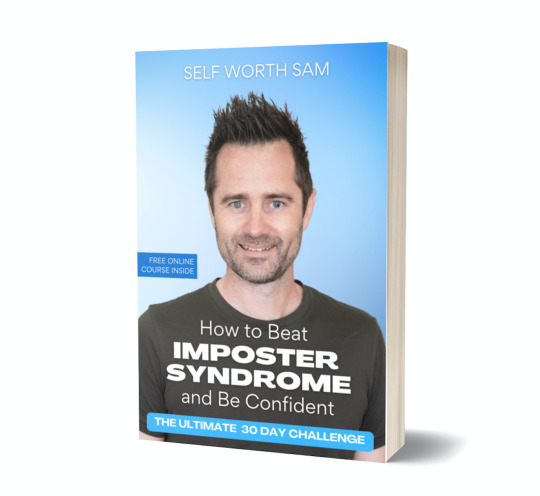
Want to take the next step to beat Imposter Syndrome and be confident? Take my free online course
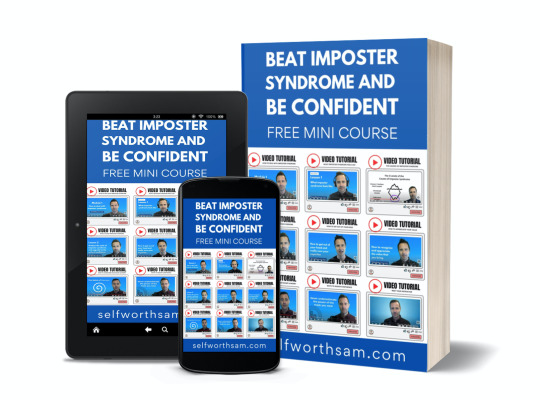
Need a speaker for your podcast, meeting or event to talk about Imposter Syndrome? Download my press kit
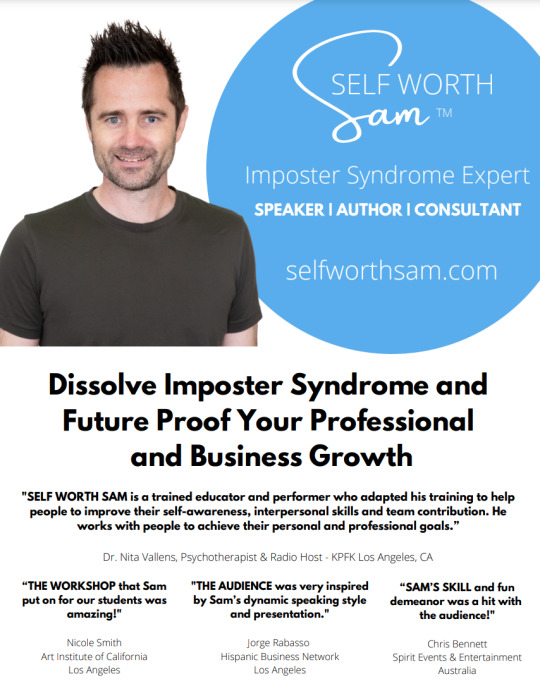
Dissolve your emotional blockages and gain new clarity and freedom. Schedule a private consultation with Self Worth Sam via Zoom schedule a session or Learn more
0 notes
Text
6 Signs Your Relationship With Imposter Syndrome Is Toxic

Imposter syndrome affects us in our career, business, relationships, spirituality, health (mental and physical), and even our financial potential. It’s possible to feel like a phony in any one of these areas of life, despite evidence of success and measurable value - and the toxic signs can show up in many ways. In this article Self Worth Sam will address these questions: what is imposter syndrome? Why do you have it? What are the 6 signs your relationship with Imposter Syndrome is toxic.
What is imposter syndrome?
According to the dictionary and research, imposter syndrome is a psychological state characterized by self-doubt around an individual’s perception of their intelligence, achievements, and self-worth - despite obvious evidence to the contrary. People with imposter syndrome feel fearful they are going to be exposed by others for being an imposter or fraud.
These individuals can feel out of their depth, even though they have often had many years experience and accolades that indicate otherwise - and even though others around them have praised them several times for their effort, skill and intelligence. These individuals simply cannot internalize their success. They are often high-achievers who believe they are never quite good enough or deserving of their position, job title, a leadership role, etc. Humans of every background, sex, gender, race, religion and age are affected by imposter syndrome to some degree but no one is spared or is affect moreso than others (according to research: Prevalence, Predictors, and Treatment of Impostor Syndrome: a Systematic Review (https://www.ncbi.nlm.nih.gov/pmc/articles/PMC7174434/)
Why do you have it?
There are a few possible reasons, according to research including: the fear of being exposed as an intellectual fraud or being incompetent at something like your job, and also anxiety, introversion, insecurity, an attitude of internalization, low expectations of success, negative thoughts and feelings about yourself regarding your achievements, beliefs about whether you believe intelligence is malleable or fixed, the amount of anger, rules and conflict in the family, perfectionism, a need to please the family, the development of “false-self”, alienation from the self and identification with the false-self, and self-importance otherwise known as narcissism.
That’s what the research says at least.
I am certain that the true cause of imposter syndrome results from trying to live up to someone else’s value system, rather than your own true values. Imposter syndrome is a result of trying to be someone else, and someone you're not ever meant to be. How can an individual ever feel a sense of authenticity, self-worth, and confidence if they continue to pursue values that do not truly inspire meaning for them, but instead pursue values that they feel obligated to hold themselves and judge themselves against? Not going to happen, right? Not until a person is clear on their own values will they shake imposter syndrome symptoms.
6 Signs Your Relationship With Imposter Syndrome Is Toxic
ONE
You deceive yourself. If you are in a relationship with someone else, and you deceive them, does the relationship grow or decay? It’s decays. A relationship involving deception towards your partner is not a healthy relationship. Would you deceive yourself if you knew it was decaying the relationship you have with yourself? Imposter syndrome is a case of self-deception. You believe your own story and the self-image you reflect upon. The original meaning of a narcissist comes from a Greek myth about a young man, Narcissis, who fell in love with his own image reflected in a pond and died because he couldn’t break the spell of self-absorption. Imposter syndrome casts a spell over us, one that can be broken. You don’t have to be caught in this spell of self-deception.
TWO
You procrastinate. Probably the most common sign of imposter syndrome often manifesting as hesitation is speaking up, going for leadership roles and job interviews, starting a business, and in general going after your dream. There is no magic pill for imposter syndrome or procrastination. However, a clear goal, a simple plan, a support system, a mentor, achievable tasks, realistic timeframes, and a reality check, will do wonders for overcoming both. Accept that you may never feel ready to make your move confidently. Accept that you will most likely make a few mistakes. Accept that it may take time to feel as confident as you want to be. Procrastination isn’t healthy. It doesn't do much for self-esteem either. However, breaking your goals down into achievable tasks and expanding your time horizon for success and confidence does increase self-esteem.
THREE
You feel intimidated by others. People with imposter syndrome often believe others are more intelligent, more skilled, and more everything than them - despite evidence that they can hold their own. Feeling intimidated by others isn’t a healthy way to live. It’s often an unrealistic perception founded on assumptions created by hearsay, quick judgements, and one-sided experience. If you are feeling intimidated by others, it’s usually because you are making a story up about someone else or a group of other people without seeing the whole picture about them. Don’t be so quick to jump to conclusions. Gather more information before comparing yourself to others. In most cases, each individual has things about them that cause you to feel they are better than you, however upon closer inspection, you will often find there are aspects to them that contradict your initial perception of them.
FOUR
You minimize yourself. No matter the time of day or night, those little things you voice to yourself can make a big impact, especially if you make negative, critical and self-defeating comments about yourself. Not healthy. Try countering the negative with some positives each time you notice yourself beating yourself up. Don’t just accept the negative self-criticism, dispute it, look for the opposite side of the story and where you were demonstrating your strengths.
FIVE
You withdraw into yourself. When you are hurting or going through some emotional issues, the worst thing you can do is crawl into a log and ruminate alone. One of the best things you can do is talk to someone about it. Get a second opinion. Talk to a mentor, friend, someone you trust or even a stranger will often do. There’s no disgrace in asking for help or asking for a second opinion about yourself. In most cases, the person you end up talking to will have probably been through imposter syndrome too, and will most likely have some wisdom to share. Forming positive relationships and having a meaningful conversation is often all we need to feel inner health.
SIX
You keep making excuses. Imposter syndrome is not going to go away if you keep making excuses for why you have it or why you can’t shake it. Excuses are toxic for the relationship you have with yourself. Rather than making excuses, start holding yourself to a new way of living. Drop the excuses about why you’re not good enough, and start showing up for yourself and those you serve. You don’t have to accept imposter syndrome as a way of life, instead you can inspire yourself to a new paradigm for being.
Read my latest book: How to Beat Imposter Syndrome and Be Confident available on Amazon in paperback, kindle and audiobook
Want to take the next step to beat Imposter Syndrome and be confident? Take my free online course
Dissolve your emotional blockages and gain new clarity and freedom. Schedule a private consultation with Self Worth Sam via Zoom Learn more or schedule a session Need a speaker for your podcast, meeting or event to talk about Imposter Syndrome? Download my press kit
0 notes
Text
The Best Approach to Imposter Syndrome for Every Personality Type
Author: Self Worth Sam, Imposter Syndrome Expert, Professional Speaker & Trained Demartini Method Facilitator

Many people experience a psychological state of self-doubt regarding their intelligence, skills and achievements, usually in their careers, business, but also their relationships. This self-doubt also comes with a fear of being exposed as an imposter, being out of your depth, not really having earned your intelligence, skills or achievements, but that luck played a part, or someone made a mistake and chose you accidentally. Imposter syndrome results in procrastination, not going for jobs you know you could probably do, not starting a business, asking someone out on a date, speaking up in meetings, feeling worthy enough for your partner, the list goes on. And when it comes to the many different types of people and personalities, imposter syndrome does not discriminate. However, imposter syndrome is most likely affecting you in it’s own unique way, depending on your “personality”. In this article Self Worth Sam will share with you The Best Approach to Imposter Syndrome for Every Personality Type.

In the world of psychological theories, there are many personality theories, and sure enough, they have been of great value to understanding ourselves and others in a myriad of contexts. However, I am of the opinion that the majority of personality theories and models are narrow for the fact that they try to box and define a person down to a few categories. Yes, this can be helpful to begin the process of understanding people and ourselves.
However, if we take into consideration that there are over 4000 human traits as outlined by psychologist Gordon Allport in the 1940s (and you need only go to the dictionary and count up the adjectives to see there’s 1000s of them) you may begin to notice a little bit of yourself in each. Yes, each! The traits and behaviors you consider good, and the traits and behaviors you consider bad, depending on your subjective biases.
Therefore there is no “best approach” to imposter syndrome for every personality type because each human has within them every type of human trait "in some form".
But wait a minute, Self Worth Sam, I’m never a sinner, or murderous, or violent? I’m often kind, generous and well-intentioned. There’s no way I contain every type of personality trait within me.
I hear what you’re saying, however, don’t look at the trait from YOUR subjective biases, look at the trait objectively and neutrally and you will find that, yes, you have demonstrated in some form every trait imaginable at some point in your life. Let's take violent as an example. You might not have been violent in the way that you (and most others too) perceive someone who is now behind bars because of their violent actions towards others, but have you been violent in trying to take your jeans off at the end of a day and they just won't come off kind of violent? Probably. It's violent, just not in the same form. You have the trait, just in another form. It goes for all traits. All of them.
To say otherwise would be clouded to your unconscious biases, and will lead you down the path to inauthenticity, or being an imposter.
Does that mean we are all imposters? Not all, but many, to some degree. And that is because most people do not live authentically. What I mean by authentically, is knowing your highest values, your values, not the values your parents or religion or society taught you to value, but the values demonstrated by your behavior and the values that originate from you heart. Not the values you try to live up to, or inject in to your life from looking up to others or being infatuated with others, but values that you have identified as your own. The test of determining your values is to look at the facts around you: what do you spend your money on? who do you spend your time with? what topics of conversation do you like talking about most? what do you fill your space with? what thoughts dominate your mind? what places do you prefer to visit? what things are important to you? Those are facts and they don’t just hint, they scream, ‘THESE ARE MY VALUES.” The facts don’t lie, so stop lying to yourself about values that you don’t truly value (because they are someone else’s).
When you are living up to the values of someone else, you’re an imposter. When you’re living in alignment with your highest and true values, you’re authentic - regardless of what you think your personality is.

So, there’s no best approach to overcoming, battling, combatting, dealing with, or beating imposter syndrome, there’s one: get present to your values and orchestrate your life around them. You’ll be happier, more productive, more courageous, confident, grateful, life will be more meaningful, you’ll look better, feel better, increase your focus, be distracted less by useless social media scrolling, less distracted and bored and therefore emotional eating.
Getting present to your values spills over and benefits all areas of your life. Once you know your values and your 100% certain of them, you’ll begin to see changes in your health, appearance, vitality, career, income, happiness, purpose, relationships, mindset, creativity, leadership, the list goes on. You will become fulfilled.
Read my latest book: How to Beat Imposter Syndrome and Be Confident available on Amazon in paperback, kindle and audiobook
Want to take the next step to beat Imposter Syndrome and be confident? Take my free online course
Dissolve your emotional blockages and gain new clarity and freedom. Schedule a private consultation with Self Worth Sam via Zoom Learn more or schedule a session
Need a speaker for your podcast, meeting or event to talk about Imposter Syndrome? Download my press kit
#imposter syndrome#when the imposter is sus#i feel like an imposter#my personality#narcissistic personality disorder
0 notes
Text
Is Imposter Syndrome Slowly Killing Your Relationship? Here’s What to Do About It.
Author: Self Worth Sam, Imposter Syndrome Expert

Do you feel like a fraud within your relationship? Do you fear exposure for being in a relationship because you feel out of your league? Do you feel you are not deserving of your partner in some way – even though there’s evidence that you are? Sounds like imposter syndrome could be slowly killing your relationship.
You don’t have to wrack your brain because you feel like you’re being chased by invisible relationship fraud inspectors, who go door to door, and Instagram account to Instagram account, looking carefully at all those cute couple photos of you and your partner on dates, vacations and at your friend’s parties, looking for imposters within relationships. *GASP!* There is no photo filter they cannot see through.
Fortunately, there is a way to know with 100% certainty that you are not an imposter within the relationship and to know with total certainty the value you bring to the relationship. Trust me, it’s greater than you currently perceive, and this blog shows you how to see it. The following ideas are inspired by the profound works of Dr. John Demartini, the world’s leading Human Behavioral Expert.
Help others who deserve to feel happy within their relationship to overcome imposter syndrome – share this article now.
The problem.
You feel out of your depth in your intimate relationship and fear being exposed, exposed by your partner perhaps, or friends, or family. Who are you afraid will ‘find you out’? The problem is not that you are unworthy of your partner. It is that you are unclear of your own true values and you are most likely injecting someone else’s values into your life, trying to live up to some unrealistic or ideal partner image, and consequently judging yourself against that value system. Additionally, you are unclear on the value you bring to the relationship, you cannot see how your partner benefits from all that you are and bring to the relationship.
No wonder you feel like a fake. No wonder you can’t work it out in your head. This article explains how to rid yourself of imposter feelings, so you can feel you’re deserving of your partner, feel authentically yourself within the relationship, and get back to the fun part of being in love with someone dear to you who most likely feels the same about you.
As you finish this article, remember this one thing: “we can only be valued as we make ourselves valuable.” That quote comes from an essay, Spiritual Laws by Ralph Waldo Emerson. If you want to feel valuable in your relationship with your partner, and if you want to know with total certainty that you are deserving of your partner, you must become aware of your value and your values hierarchy (the things that are most important to least important to you).

Let’s start with identifying your highest values and your hierarchy of values.
You can do this a couple of ways: list your top 3 values. Write or say them out loud to yourself. What are you top 3 values in your life right now? Describe them in any way you like. Another way to identify your values hierarchy is to put the following 7 areas of life in order from most to least important:
Spiritual
Financial
Vocational
Familial
Social
Physical
Mental
These are broad terms to help you check-in with yourself in different areas of your life. Naturally, you will perceive some as really important, while others don’t even come onto your radar. So don’t feel you have to include them in your values hierarchy list. Plus you can do this exercise as much as you like, because your values are likely to change over your life.
Take note, you do not want to list the values you think you should or ought to value. Meaning, you don’t want to list the values that your parents would want you to value, or society would want you to value, or your unrealistic idealized self would have you value. Drop the self-judgment and be true to yourself.
One of the main sources of imposter syndrome in all its forms, especially in one’s career or relationships – and all emotional blocks and baggage for that matter – is a result of injecting the values of others into your life and trying to live up to them. If you try to live according to someone else’s values you are an imposter – you’re faking it – you’re trying to be someone else. When you are living in alignment with your highest values, you’re authentic. To schedule a session with Self Worth Sam and clear your emotional blocks click here
Next, to know the value you bring to the relationship, do this: define and identify the meaningful and worthwhile things you bring to the relationship in all areas of your life: spiritual, financial, physical, mental, social, familial or vocational, and how you demonstrate and share them within the relationship – how all that benefits your partner and the relationship as a whole.
Let’s go through each area so you can start identifying your values:
Spiritual:
I don’t mean necessarily religious values, but the meaning of your life, your purpose and the cause to which you are dedicated to serving long-term. Often this is a cause that contributes to others in some way rather than just yourself. Ask yourself, what is the meaning of my life, to what cause am I dedicated, how does that benefit the relationship and my partner? Have you assisted your partner define their spiritual path or have you assisted in some significant way to their spiritual growth and healing? That’s valuable.
Financial:
Obviously, this can mean the cash, earning capacity, and assets you bring to the relationship for shared expenses and lifestyle. It can mean financial wisdom and know-how, too, such as a well planned investment strategy and legacy. I’ll also include emotional management skills here too. Ask yourself, in addition to earning and managing your finances, do you bring effective emotional management regarding your wealth (can you save, spend appropriately, invest wisely)? Does it benefit your partner and the relationship as a whole?

Vocational:
Your career or business. Ask yourself, how does my career or business benefit the relationship and your partner? Do you contribute to conversations about their career pathway, have you connected your partner with others that led to better job opportunities, are you able to provide them with emotional and intellectual support when they are feeling stressed about their job or business? That kind of support is highly valuable in a relationship.
Familial:
If there are children involved, they most likely required you to bring them into the world (never forget that one fact). Ask yourself, how does my time, effort, skills and knowledge as a parent contribute to the relationship and my partner? If children are involved from previous relationships (not of your blood so to speak), how are you being a parent for them? That’s a huge value to your partner and the kids. What about your family? Do they provide a valuable support system for your partner and kids? Do you have parents who help out now and then, baby-sitting for example? More value.

Social:
Who are your friends, acquaintances, and connections? How have they contributed to your partner and your relationship’s social enjoyment? Have you been able to share fun times together with your friends? Have your friends and connections included your partner in some way and made them feel welcome in their circle? It’s nice to be accepted by your partner’s friends and connections. Does your partner gain from your sense of what it means to be social? I say this because you don’t have to be a social butterfly nor have an extensive network of friends to provide social value to your partner and the relationship. Socializing can also include the maintenance of healthy boundaries, for example, knowing and respecting their do’s and don’t around social media sharing of your life together. Do you facilitate trust in the relationship? A massive value. Do you balancing time with people and time alone, both with each other and your respective individual space? Yes? More value. Respecting your partner’s social needs is a big value to them.
Physical:
Your body, appearance, health, vitality, and physical possessions too. Ask yourself, what are the benefits my body and appearance provide my partner? Do they gain from getting to look at you each day? You’re totally allowed to boast a little here Do you have a hot butt? Do you have sexy hair, legs, tits, hands, shoulders, eyes, lips, neck, and let’s not forget the bedroom benefits either – are you good in the sack so to speak? Do you have a signature move your partner couldn’t live without? Do you have healing hands and can you massage like a boss, and do those hands come in handy at the end of their busy day? More value. Do you have a healthy, agile and capable body? Does that allow your partner to go places with you with ease (don’t take that for granted and don’t assume it’s not a huge value to them).
Do you have a level of health that doesn’t require your partner to have to assist you in some way? Do you have healthy eating and exercising habits that contribute to your partner’s health? Do you provide knowledge about healthy living from all those podcasts you listen to about getting better sleep, the right foods to eat, anti-aging, how to cook great meals? All that contributes more value to them and the harmony of your relationship. Consider also physical possessions that you own and they get the use and benefit of it too: a house, a car, furniture, physical space, gifts, and the physical atmosphere and mood you create. Do you have the ability to navigate, drive, find great places to eat, go on vacation, can you get them out of challenging physical situations, emergencies, sickness? All worth considering, aren’t they?

And lastly,
Mental:
Your mind, knowledge, education, leadership capacity, creativity, bilingualism, planning, decision making and problem solving skills. Are you good at prioritizing and managing life for both of you? Do you provide inspiration and wisdom to them? Do you have a good sense of humor? Do you make them laugh? You can put a price on making your partner laugh – consider how much a ticket costs for attending a comedy night – how many times do you make them laugh per week – calculate that up to find the financial value they are saving because they don’t have to go to the comedy show, instead they be entertained by you. What is the mental value you contribute to your partner and the relationship?
These are just beginning prompts to help you identify where you bring value to your partner and the relationship as a whole.
Start an audit of your value today and imposter syndrome feelings will subside. Continue identifying the value you provide until the exact moment when you can say with total certainty, “I am worthy of my partner to the exact same degree that my partner is worthy of me.” A tear of gratitude for yourself is clear evidence that you have equalized your perceptions and have eradicated imposter syndrome completely.
To summarize.
If you can’t identify your values and the value you bring to your partner and the relationship – precisely – and to the same degree and amount of value your partner provides to you, you’ll forever feel like you’re moments away from being exposed as a fraud, perhaps by your partner, friends, family, everyone on social media and the invisible relationship fraud squad. You’ll continue to believe your own bullshit story about not being good enough for them. You don’t need to live in that nightmare. Identify the value you bring and start telling yourself a better story.
So, as you go about your day, remember Ralph Waldo Emerson’s quote from his essay, Spiritual Laws, “we can only be valued as we make ourselves valuable.”

Read my latest book: How to Beat Imposter Syndrome and Be Confident available on Amazon in paperback, kindle and audiobook.

Want to take the next step to beat Imposter Syndrome and be confident? Take my free online course

Need a speaker for your podcast, meeting or event to talk about Imposter Syndrome? Download my press kit

Dissolve your emotional blockages and gain new clarity and freedom. Schedule a private consultation with Self Worth Sam via Zoom Learn more and schedule a session here
0 notes
Text
The Rise of Imposter Syndrome and How to Make It Stop

According to Google Trends, just after Covid-19 was declared a pandemic by the WHO and the planet went into lockdown, the search term “imposter syndrome” peaked. Why? What caused the rise of imposter syndrome at this time? Here are my speculations.

Was this because people lost their jobs and now started feeling they weren’t good enough to compete in the job market place – being that millions were now looking for work too? Did idle time at home create the conditions for doubtful thoughts to creep in? We all know that during lockdown, many people suddenly realised they had all this extra time, and while some got creative, many got bored – and that means time to reflect on life… and themselves.

Help a colleague or friend overcome imposter syndrome and share this article. Imposter syndrome is a feeling of self-doubt and personal incompetence that persist despite your education, experience, and accomplishments, you feel like an imposter.
My claim is that when people have time to reflect, the value of who they are and the meaning of their life rises to the forefront of the mind. It wasn’t just the pandemic that brought imposter syndrome into people’s awareness more so than before, but it certainly must have been a big contributing factor.
Imposter Syndrome has been a topic of research since Pauline Rose Clance and Suzanne Imes conducted their research in the 1970s, and I believe many people worldwide question their value (and self-worth) in all areas of their life (not just their careers) in general a lot of the time, don’t you think so too? Regardless, imposter syndrome is rising in conversations all over the place. So, if you experience it, how do you make it stop? In this article, I will show you how.
When an individual is unclear about their highest values, they’re an imposter. When an individual is crystal clear of their highest values, they’re authentic.
Imposter syndrome is often defined as feelings or thoughts of self-doubt regarding one’s achievements, intelligence and skill. However, people can feel an imposter even with a relationship (e.g. not being good enough for their partner). It can have crossovers into personal finance and success, leading to thoughts of not being deserving or worthy of wealth and success. Reflecting on your self worth (as well as your highest values) is central to stopping imposter syndrome – and feeling authentic, and loving and appreciating yourself for who you are, and for what you can do, have a track record of doing, and accomplished. An objective view of yourself will do wonders for your self worth.
If an individual is feeling like an imposter, or they fear being exposed as one, it is often because they are injecting the value systems of someone else and trying to live up to those values. This puts a person into a never-ending state of over-thinking where there is no way out – because when you are trying to live up to the values of another, there isn’t one.
Be discerning about what your true values are. Ask yourself, within whose value system am I judging (and therefore labelling) myself as an imposter? It could be another person, parents, someone from your past. It could also be an idealised version of yourself created by yourself. End the judgement. Clarify your true values and stop trying to live up to the values you think you should or have to live up to.
When you clarify your highest values (aim to define your top 3) and you set goals, plans and visions around them, you’re more likely to achieve them. You’re also more likely to increase self-worth as a result too. When you complete a task, no matter the size, and you can see how it fulfils one or more of your highest values, you feel good about yourself and you feel authentic. And whereas, when you try to live up to the values of others, you end up procrastinating and feeling defeated, but when you complete a tangible task or goal in alignment with your values, you feel in alignment with what is important to you – you feel you’ve found your center – you have a sense of your value and worth.
So: a pencil, some paper – now! Write down your values. They could be financial stability and wealth, physical health and beauty, social connections and fun, family growth, business growth, spiritual meaning and purpose, expressing your mental capacities and learning. Then review them tomorrow and each day from this day on. Reminding yourself of your values is key to being and feeling authentic.
Your values will most likely change a little over time as you review and refine them. Ask yourself, what am I truly inspired to do, be and have in my life? What brings me to life? Where am I most organised, disciplined and passionate? Therein lies your true values. Write your values in a way that speaks to you and comes from your heart. When you are aware of your highest values and act on them, you can never be an imposter. Get going. You’re going to love it.
Read my latest book: How to Beat Imposter Syndrome and Be Confident available on Amazon in paperback, kindle and audiobook

Want to take the next step to beat Imposter Syndrome and be confident? Take my free online course

Dissolve your emotional blockages and gain new clarity and freedom. Schedule a private consultation with Self Worth Sam via Zoom Learn more or schedule a session
Need a speaker for your podcast, meeting or event to talk about Imposter Syndrome? Download my press kit

Official Website
http://selfworthsam.com
#i feel like an imposter#imposter syndrome#businessintelligence#entrepreneurship#motivation#personaldevelopment#education#covid 19
0 notes
Text
10 Insights for Human Beatboxers to Beat Imposter Syndrome Written by a Former Professional Beatboxer

Share this article with a human beatboxer you know who is going through imposter syndrome.
I procrastinated for about 10 years before I started taking action on my dream to be paid to beatbox. From age 18 to 28, it was simply a dream, and even though everyone around me said I’d be great at it, I still felt I wasn’t ready, good enough and like I was an imposter. I also felt I needed everything to be ready and perfect before taking any steps. I suffered from perfectionism and imposter syndrome a lot. Looking back, I would have started taking risks and putting myself out there if I’d know a few of the things I’m going to share with you in this article. It’s not everything I realized was key to getting paid to beatbox, but certainly the keys to starting.
I was first paid $500 to beatbox at an elementary school in 2010 for a 2 hour show. In order to get that booking, I had to overcome my fears of rejection and imposter syndrome and just start phoning people. I called over 100 local schools and asked to speak with the Principal or Coordinator. The first 20 times were not smooth because I was making it up as I went along — making up the bit about what I could offer them and why they would benefit from a beatboxing workshop or presentation. I realized soon that just because beatboxing was cool and the kids would love it, wasn’t a good enough selling point for the person signing the check.
Then I made $250 an hour as an entertainer for children’s birthday parties with a beatbox theme. I brought along my loop machine and amplifier, plus I had some “sound recording” activities and games that I could use to fill the time. I remember thinking at the first few parties I did, ‘these guys are going to find out I’m making it up as I go along!’ But I persisted and people started referring me to their friends.
Over time (about a year), I built up the courage to start cold calling universities, musical festivals, shopping center management, and government agencies (just to name a few) and asking to speak with the person in charge of marketing and events. Again, after the first 20 phone calls — and sounding like a rookie — I got the hang of it and discovered my own flow and how to speak to people so that they would say, ‘that sounds like something we’d be interested in, can you email us the details and insurance?’ Yes, insurance, professional indemnity insurance. Everyone (except when doing a child’s birthday) wanted you to send them proof that you were insured.

10 Insights for Human Beatboxers to Beat Imposter Syndrome
Here are 10 ways (or key ideas) for beatboxers who are starting out and feeling the effects of imposter syndrome, perfectionism and low-confidence, that I wish I’d known before I started.
Crystalize your highest values: this is the most important thing to do. Write a list of your top values. That list could be 3 things or 10 things or more. Your values are the things you hold most important and meaningful. They are YOUR values not the values you think you should hold important. If you try to live up to the values of others, you’ll forever feel like an imposter and be left wondering where you went wrong and why you aren’t truly fulfilled (or successful) in life. For example, ny top values are learning, teaching, saving/investing money, traveling, designing, dancing, dee-jaying and writing. Your values could be drawn from spiritual, financial, social, familial, vocational, mental or physical realms of your life. Write a list and refine it over time. Keep them in the forefront of your mind at all times.
Appreciate rather than compare yourself to others. When you compare yourself to others (especially more experienced and more successful beatbox performers) you’re setting yourself up to feel like a bigger fraud and failure. Don’t do that. Instead ask yourself, what are the benefits to me that this guy or girl beatboxer is giving me now? Are they showing you what’s possible with your career, your own performance, and don’t forget, what’s possible with the human voice. Appreciate them for that. Put them in your heart and give a mental thank you. This was you won’t beat yourself up nor resent them for being who they are and where they are.
Drop perfectionistic tendencies. Mastery takes time. A master never stops learning and refining. Stop kicking yourself for not achieving some unrealistic ideal of how you should be as a beatboxer. Take your time and enjoy your growth. Good things take time to mature and get up to top speed and performance. Things and people who peak too early, usually crash just as quickly. Be in this for the long-term and you will be happier and more fulfilled. I found when I was trying to be perfect, I just made things harder for myself. I liked living by a philosophy of, practice makes pretty good. Remember not everyone can beatbox, so your easiest beat or rhythm will still give great value and entertainment to most of your audiences.
Choose inspiring role-models. My first role-model was Reggie Watts for his humor, improvisation skills and the way he interacted with the audience. You could see he was having fun and the audience was having fun too. He inspired me to relax in front of my audiences and it made a big difference. My next role-model was Dub FX. When I saw his street performance YouTube video, I remember saying, ‘Now THAT's what I want to do.’ I went straight to the music gear store and bought the same Boss RC Loop Station Pedal and the BOSS GT Guitar Multi-Effects Processor Pedal that he used in his performance. And when I saw Beardy Man do his cooking show beatbox video! Wow, I thought, that’s creative. Find yourself an inspiring role-model and learn from them.
Contribute to local and global beatbox communities. A very fulfilling aspect of being a beatboxer is contributing to the community of fellow sound makers. The web and social media makes it easy to reach out and ask, can I help out with local events, can I be a judge at a beatbox battle, can I just help out in some way? You don’t just have to be the one on stage performing to contribute. And there’s no reason why you can’t connect with beatboxing communities world-wide and ask, how can I get involved and help out? The Buddha once said, ‘when you make yourself less in the center of things, you become more human.’ I say, when you make yourself less self-important, you become more more authentic (and imposter syndrome).
Invest in quality equipment and look after it. When I bought quality gear, I felt more professional. I felt I was dressing for the job I wanted. When I used my gear, I felt a higher sense of self-worth because I’d invested quality into my passion. Having good quality gear made me want to look after it better, and it made me want to look after the business and career side of being a beatboxer even more. And that meant, valuing myself more, rather than beating myself up or believing my own negative thoughts. Funny how when you put some skin in the game (in this case, buying quality gear) that your sense of self worth increases too.
Choose a meaningful stage name. My beatbox name (Samwise) was given to me, so I took it. I never knew what to call myself, so I am appreciative of the friend who gave it to me, and appreciative of myself for having the awareness to accept such a gift - seemingly in a random way. Sometimes we become our stage name. We develop another personality. Sometimes it’s medicine for our own growth - a mantra for our spiritual healing even. Nevertheless, choose or find a name that fits you. Make it a little easy to say and remember. Make is meaningful and authentic for you so you can be proud to say your own performer name.
Serve your audience. If you feel like an imposter before, during or after a performance, it’s because you are too focussed on yourself. Stop it. Redirect your focus to the audience and the booking agent. Your goal is to give them a great show so they go home feeling better than when they arrived. Don’t worry about your mistakes, they won’t always notice them. Your performance has the power to make people feel accepted and included. Many people feel afraid of participating in life, and performing on stage is an opportunity to bring light to their life. Serve with heart. When you’re serving, it’s impossible to be an imposter.
Be open to collaborating with others. This has to be one of the most fun and adventurous ideas I can give you. When you are open to collaborating with other performers (not just beatboxers) you will open doors you never thought existed. Joseph Campbell said, ‘follow your bliss and the universe will open doors where once there were doors.’ As a result of being open to collaborating with singers, Capella groups, choirs, DJs, professional speakers, business owners, and a range of other entertainers of children, I have been invited to to perform in places (and often be paid too). You want to collaborate. It’s good to mix with others as you will gain invaluable advice, creativity and support. You will also be able to bring your own unique skills and experience to the table. You never know where a door will lead. The more people you meet, the more you’ll realize others go through imposter syndrome too and together you can support each other.
Be realistic and humble yourself. No one likes a performer with an ego. These types don’t seem to last. They tire easily and others tire easily of them. Remember your manners, be generous with your time, admit when you’re confused or wrong. You will be invited back more, liked more and your network will expand beyond your imagination. In short, be kind and don’t be an asshole. Be genuine and stay grounded. Be thankful and grateful each day that you pick up the microphone and drop a block rockin’ beat.
Good luck.

Read my latest book: How to Beat Imposter Syndrome and Be Confident available on Amazon in paperback, kindle and audiobook
Want to take the next step to beat Imposter Syndrome and be confident? Take my free online course
Dissolve your emotional blockages and gain new clarity and freedom. Schedule a private consultation with Self Worth Sam via Zoom Learn more or schedule a session
Need a speaker for your podcast, meeting or event to talk about Imposter Syndrome? Download my press kit
0 notes
Text
2 Quick Tips for Teachers with Imposter Syndrome
Author: Self Worth Sam, Imposter Syndrome Expert

Are you a school teacher with imposter syndrome? What’s that you ask? Imposter syndrome is a psychological condition of self-doubt regarding an individual’s intelligence and achievements, accompanied by a fear of being exposed as a fraud, or imposter. Do you want to know how to dissolve it so you can shine in the classroom instead of shrinking? This article is for you. It’s written by a former school teacher who had imposter syndrome and is now an Imposter Syndrome Expert, Professional Speaker, Author and Trained Demartini Method Facilitator.
Help other teachers going through imposter syndrome and share this article.

Teaching is often a challenge and if you doubt yourself in the classroom as well, it certainly makes teaching frustrating and debilitating. Frustrating because your peers remind you often that you’re a great teacher, but you can’t see it. Debilitating because you feel you’ve deceived your peers, yours students, and their parents, and they are going to call you out as a fake. The secret to feeling like an authentic teacher lies within your highest values. In this article Self Worth Sam will share with you 2 Quick Tips for Teachers with Imposter Syndrome.
When you plan your life around someone else’s values, you’re an imposter. When you try to live up to an ideal version of the perfect teacher, you’re an imposter. When you compare yourself to other teachers, you’re an imposter. But when you plan your life around your highest values, you’re authentic. When you live up to your own values and vision of yourself as a teacher, you’re authentic.
Remember studying teaching at university, and how part of the coursework was to do work experience in a school for a few weeks? Remember that? I was so nervous I bought myself a gallon of cheap red wine and chugged back a glass at 7:30am and went off to “practice teaching.” I needed that glass to calm my nerves. I recall feeling so self-conscious and stupid in front of those teenager students and my supervising teacher. It got worse when the university sent the official observer mentor to assess me. I’m not religious, but I remember thinking, “Dear God, one of you, I don’t care which one, but give me strength now.” No gods aided me that day, but the red wine certainly did. And the next day. And the next day.
Eventually, and fortunately, I didn’t need the glass of wine ever again (well, not at the beginning of the day). Realistically, I only needed liquid courage for about a week until I found my feet and started having fun. Teaching is fun once you get your head around the fact that with a clear aim of the lesson, a plan sketched out on a scrap of paper and an essential question (and Kahoot or Quizlet) you’re good to go.
However, months into my first teaching placement, imposter syndrome was felt once again. I thought to myself, “c’mon, I can do this, what’s this over-thinking tendency all about? What or who am I comparing myself to?” And that’s when I caught the first glimpse of the ‘error of my ways.’
Again, a couple of years later, when I was teaching grade 1 & 2 in a Waldorf / Steiner elementary school, I was having conversation with a peer. She said, how’s things going, Sam? To which I replied, ‘oh, you know, trying to be the perfect teacher.’ And I got it on a whole new level. Stop trying to be the perfect teacher and start being yourself — it makes teaching far more easier and enjoyable.
Photo below: me dressing for the job I want (age 18 months I think)

It has taken me a decade of teaching across K-12 and Adult education to clarify my values and truly feel authentic. Looking back, I can see that I was addicted to a fantasy of trying to be someone I’m not, and that I judged myself for not being that ideal of a teacher. Consequently, I felt like an imposter — even though I was not.
Perhaps, you can relate to my story? And if you are going through imposter syndrome as a teacher, here’s my two tips (because it’s mid-August and teachers are back in school — at least in the USA — where I did teach for a few years — shout out to my LAUSD and Burbank Unified peeps).
Tip #1
Get a pencil and a piece of paper (I know you probably can’t spare them, so use google docs or something) and write down about 7 things you value. THAT YOOOOOOO VALUE. Not the values you think you should value. Not the values of your school, your parents, or the exaggerated and unrealistic ideal values you think a teacher must have. Clear your mind for a moment and ask your heart, what do I truly value? List about 7 things you believe to be meaningful, important and inspiring to YOU. Now order them from most to least important. This is your hierarchy of values. The more you reflect and refine them over the years to come, the more authentic you’ll be.
Tip #2
Define personal and professional goals that help you fulfill those values. Do not negotiate on this. A goal connected to your highest values gets done. Notice how you always have time and energy for the things you really want, but can’t seem to complete things you don’t value? Surprise, surprise, right? Stop beating yourself up for trying to accomplish goals that you don’t care about and start inspiring yourself about goals that you do.
Extra tip.
Do this activity with your students and with teachers at the next PD (don’t include the admin, they often don’t know a good thing when it slaps them in the face — I’m kidding, only a little bit). Start a conversation about values in your class and at your school. Not the school’s values, the values of each human being. No teacher or student goes to school to fulfill the values of the school, they go to school to fulfill their own. Facilitate the discovery of their values. End the BS of “we all value this” and start a culture of true authenticity.
You know what goes well in a conversation about values? Purpose. In his book, “The Path to Purpose: How Young People Find Their Calling in Life,” author William Damon (Professor, Stanford University) nails it down to 3 things parents can do (and teachers too for that matter) to foster purpose in their kids.
Start a conversation with your kids or students about your own values and why you do the things you do (work, raising a family, recreation, etc)
Introduce young people to adults who are living a life with a clear purpose — give young people examples of adults outside the family who love life as a result.
Talk to young people about the financial responsibilities of their chosen path in life.
I like the last one the most. I observed that teachers didn’t like talking about money with students, except on a surface level way in careers and enterprise classes. What I found missing in school was a realistic conversation about what we all did with our money. Because what we spend our moola on shines a big light on what we truly value. Anyway, that’s for another blog. In short, I am convinced that young people and teachers would benefit enormously from conversations about the realities and the psychology of saving and investing, particularly how it relates to self-worth or the lack of it. Again, that’s for another blog.
To summarize. The fact that you experience imposter syndrome is, in light of what we’ve now discussed, a great teacher in disguise. Appreciate that part of yourself. It will transform and grow you as a teacher. Have an authentic year, teachers! You’re doing important work and you are appreciated. Now start appreciating yourself too.
Subscribe to this blog
Take my free online course

Dissolve Imposter Syndrome Today and Future-Proof Your Professional Growth. Book an appointment.
Need a speaker for your podcast, meeting or event to talk about Imposter Syndrome? Download my press kit
Read my latest book

#imposter syndrome#i feel like an imposter#teacher#teaching#teachers#new teacher#teacher stress#teacher burnout
1 note
·
View note
Text
How DJs With Imposter Syndrome Can Remix A New Mindset

I love mixing, always have – but I didn’t like the bit when I started out DJing – the bit where my hands were shaky as I tried to cue up the next track, just as I’m getting into my set. They shook because of the nerves of wanting to make it a smooth mix and keep the party going. Back then I felt little like an imposter, like I wasn’t good enough to be up there in the booth – the one choosing the tunes – but there I was: feeling a dose of imposter syndrome regardless. Imposter syndrome affects people everywhere, even DJs.
This article is for DJs who go through imposter syndrome: self-doubt around their skill, intelligence and achievement despite evidence of on-going success plus a fear of being exposed as a fraud. It’s brutal.
I’m writing this from a few years of experience DJing at weddings, nightclubs, parties, music festivals, business events, shopping center events, university open days, 40ths, 50ths and pubs. I’m writing to give some insights (and encouragement) to DJs everywhere who experience a little fear about being exposed as a fraud, even though they know they can do the job and venue managers continue to book them because they can do the job.
Does imposter syndrome come with the DJ territory? Maybe. Does it have to? Not forever.
DJing is performing. It’s also pressing a lot of buttons and turning a few dials too. There is an element of you being watched by the audience and they are relying on you to put on a good show. We get up in that booth, hook up our console and (besides having a bunch of fun) it’s still possible to have a little voice in our heads say, “don’t screw this up or they’ll find out you’re not a real DJ.”
What is a real DJ anyway but an unnecessary, unrealistic, and exaggerated mental comparison to Carl Cox, Subfocus or Astral Projection? Perform with some heart. Be present for the crowd.
I remember I’d been DJing for over two years and had weekly bookings around town, yet I rocked up to this one event and there was something about it that caused my nerves to shake and for imposter feelings to return – even though I’d thought I had conquered it.
I can imagine there are DJs who never experienced it, and some that have in varying degrees. So what can be done about it in order to keep the music playing and a smile on your face? Well, we all know what it means to remix the tracks in order to create the mood on the dance floor, so apply the same idea to your mindset. Remix it.

The causes of imposter syndrome, according to research, include things that happened in childhood, plus environmental, cultural, systemic dynamics, narcissistic tendencies (self-deception and self-absorption), perfectionism, over-thinking, etc. And though tackling imposter syndrome from those angles can be a bit of a rabbit hole, we can certainly practice self-governance and manage our mindset to reduce imposter syndrome - which is what I help my clients with in my private consulting and coaching sessions - book a session here) When you are not aligned to your highest values, you’re an imposter. When you’re living in alignment with your values, you’re authentic. Live in alignment with your highest values – the things you hold important, meaningful and worthwhile and you’ll feel confident in what you do, you’ll be willing to endure the pain of your chosen path, willing to endure moments of doubt, because you are focused on contributing to the joy of your audience out there on the dance floor – not to mention you get paid to play. Put it this way, when you remix your mindset, the dance floor is not ‘out there’, your audience is not out there (or down there) on the floor, you are there with them in the dance. I’m not a religious person, however if I was to choose, I think I’d be Hindu for the one fact that they see the cosmos as a divine dance between Shakti and Shiva – the two polar energies of the universe. It’s all encompassing. It says, yes humans, you are part of this dance with your strengths, creativity, dreams, AND your faults, defects and nightmares. It gives you permission, or rather invites you to chill out and accept things the way they are and navigate and mix from that expanded and inclusive mind-frame. In short, if you’re a DJ with imposter syndrome, get present to what is of value to you and you’ll never be an imposter, fake or fraudulent. You’ll be in the flow. Now drop that next track with some heart.

Want to take the next step to beat Imposter Syndrome and be confident? Take my free online course
Dissolve Imposter Syndrome Today and Future-Proof Your Professional Growth. Book an appointment.
Need a speaker for your podcast, meeting or event to talk about Imposter Syndrome? Download my press kit
http://selfworthsam.com
0 notes
Text
Some Wise Words for Children’s Entertainers With Imposter Syndrome
Author: Self Worth Sam, Imposter Syndrome Expert
Article Highlight: Then there’s moments when you’re with adults (while not on the job) and someone asks, ‘what do you do for a living’ and even though your words may come out right, the feeling behind it indicates a lack of self-conviction. Again, feeling like a fraud and as though you’re about to be exposed for it.

Full Article:
I thought I’d never be a children’s entertainer, but I ended up hosting a handful of birthday parties in residential homes, public parks, community fairs and the like.
For more than the first few times, I perspired. From the moment I departed my home, drove to the venue, entered the house or park area, greeted the parents, the kids and the dog, I sweated. They’re going to call me on my act. They’re going to expose and accuse me for being an imposter!
Imposter Syndrome affects many people, including entertainers, and particularly children’s entertainers. I’m not saying these kinds of entertainers are affected more so by the psychological condition of self-doubt despite being good at what they do, than others, I’m simply recounting my experience of being one and hopefully it will cast some light on my fellow entertainers of little angels and spoilt brats.
I know what you’re going through, even if you’re an experienced entertainer. You get to the event or venue and even though you’re truly prepared, and fairly good at managing a crowd of Oompa Loompas, you’re on mid to high alert for that moment when someone points the finger and accuses you of being a fake, of not a “real” entertainer, of not having a “proper job” (that one used to dig into my sides like a thorn), and shouting, “Sus! Sus! Sus!”
Then there’s moments when you’re with adults (while not on the job) and someone asks, ‘what do you do for a living’ and even though your words may come out right, the feeling behind it indicates a lack of self-conviction. Again, feeling like a fraud and as though you’re about to be exposed for it.
In addition to children’s birthday parties, I used to run special FX make-up parties, science themed parties, and even dress up as Frosty the Snowman and walk around Pasadena, California each Christmas with Grinch, Rudolf and the Abominable Snowman.
Now, when you’re wearing a costume and no one can see your face, you don’t mind what anyone thinks or says about you. A mask or costume can do wonders for reducing imposter syndrome, and it’s cheaper than therapy.
But say your act doesn’t call for a mask, like mine did when I was hosting human beatboxing and sound effects birthday parties for kids, and people see you. They see right through you. They see the real you. And as genuine and personable as you may intend to be (or truly be), one little self-doubting thought in your own mind can drop your self-esteem in seconds, and you still have to complete the show.
Fortunately, there are solutions for reducing imposter syndrome as a children’s entertainer. Firstly, remind yourself that it’s about those kids and making their day memorable. Forget your pride or shame and have some fun.
Secondly, be 100% honest with everyone you work with. The parents, the kids and the dog. If anyone questions your competency or intelligence or whatever, reply along the lines of, ‘you’re right, sometimes I feel like I’m not good at what I do, but I am going to do my best to make sure you have a good time. Now, shall we get on with the show?’
Tim Gard CSP & CPAE, one of the greatest professional speakers I’ve ever met, once said, “no one can stop me from seeing the fun.” I like that. He has given thousands of presentations, traveled thousands of miles, stayed in countless hotels, and attended countless conferences, and when he came across a stressful or difficult situation, he’d choose to see the fun – not make fun of people, not have fun at other people’s expense, but see the fun in the situation and try to bring a smile to those around him. I think as children’s entertainers, remembering to see the fun is medicine for the soul, and imposter syndrome.
Last weekend, I was Spaceman Sam for my nephew’s 4th birthday. I’d never been Spaceman Sam up until a month before the party, my sister texted me on Telegram: ‘Hey bro, will you entertain at my son’s birthday? It’s a space theme and you can be Spaceman Sam. Are you in?” (or words to that effect). I replied, "I'll see what I can do."
Here's what I came up with.

With not a lot of preparation, I jumped right in. I bought an astronaut suit online and recalled some icebreakers, games and activities for 4 year olds that might work. My sister originally said, ‘there will be my son plus 4 of his friends from kindergarten.’ Turned out to be 20 kids and all their parents. A little imposter syndrome perhaps at that moment? Would you believe it, no. Why? Because I’d learned to see the fun. Now go do the same, because imposter syndrome doesn’t stand a chance when your authentic in your heart and you make it about the kids.
Photo below: me as Spaceman Sam at my nephew’s 4th (August, 2022)


Want to take the next step to beat Imposter Syndrome and be confident? Take my free online course
Dissolve Imposter Syndrome Today and Future-Proof Your Professional Growth. Book an appointment.
Need a speaker for your podcast, meeting or event to talk about Imposter Syndrome? Download my press kit
My newest book:

0 notes
Text
2 Essential Truths Every Entrepreneur And Content Creator Should Know to Combat Imposter Syndrome
Author: Self Worth Sam, Imposter Syndrome Expert

From one entrepreneur and content creator to another — I can appreciate what you’re going through — imposter syndrome. The psychological condition characterised by self-doubt DESPITE evidence of your ambition, progress and results. DESPITE being academically credentialed, experienced in the ups and downs of life, and pretty much everyone around you telling you, “you’ve got this.”
Yet…
Yet…
YET!
You continue to perceive that you are a bit (or a lot) of a fraud, waiting for you audience, family, friends, and those that matter most to you, to post their own content about you, with headlines such as, “SHAME ON YOU, YOU BIG FAKE!” And, “how dare you even consider calling yourself an expert?” And, “Get down off you self-appointed high-horse and go get a proper job!”
Ouch.
Ooouuuucccchhh.
Funny thing is, you’re the only one who believes that story.
THE ONLY ONE.
Sure, you might get some trolls come your way.
Sure, you might make a few mistakes as an expert, but experts accept mistakes as part of the game of business and personal development. In fact, mistakes are valuable learning lessons. So take a deep breath and appreciate the mistakes as keys to your growth as an expert. They make you stronger, more authentic, and even more relatable to your audience — as an expert. People want experts who can relate, not some perfected expert.
Yet.
Yet and yet, I hear you say, Sam, that is all very well and good, so why do I still feel like an imposter? Answer me that.
Ok, I will.

The reason you feel like an imposter comes down to this powerful statement:
Whenever you are NOT living in alignment with YOUR own highest values, you’re an imposter and you will continue to feel like one unless you STOP trying to live up to the values of someone else (real or imagined).
When you ARE living in alignment with your highest values, you’re authentic, objective, willing to endure pain in the pursuit of your highest values, fully conscious of your strengths and weaknesses — and you appreciate both aspects of yourself.
So the next step is to get crystal clear on your highest values. CRYSTAL clear. And it can take a little time to refine your top 3 values. And when you do, it activates true mindfulness, true authenticity, and self worth goes up. So prioritize time to get clear on them today. It will be time well spent. It will reduce imposter syndrome significantly. I make time for refining and reflecting on my highest values daily. It is THE MOST important task an Entrepreneur and Content Creator can do with their day. And even 5 minutes is worthwhile.
Get something to write with and a piece of paper — or some post-it notes — we Edupreneurs who have taken Sarah Cordiner’s Concept to Course program know the value of post-it notes ;)
To help you clarify your highest values, consider the 7 areas of life: financial, vocational, physically, familial, mental, spiritual, and social.
Even if you ordered those 7 areas of life from most to least important, it will be a great start.
To get even clearer, write specific values and order them from most to least important.
The trick here is to avoid writing values that you think you ought to value, or have been told to value by family, friends, business gurus and society. Get present to YOUR values and make sure not to inject the values of others. Otherwise you will find it challenging to fulfill a value that isn’t really in your heart.

Here’s my specific hierarchy of values as an example.
Mind you, this is what my values are at the time of writing this, and they may change over time, so might yours. Again, all the more reason to reflect regularly to ensure you are aligned and not wasting your life trying to live up to someone else’s values.
1. Learning 2. Teaching 3. Writing 4. Saving & investing 5. Travelling 6. Designing 7. Socialising & networking 8. Working out 9. Dancing and Mixing (as in when I turn into DJ Samwise) 10. Wining and dining
When I am clear on my values (as you will be too) I am able to set realistic goals that are achievable and inspiring, and nothing gets in the way of me pursuing them — even if I know it will take many years to get there.
Here’s the thing about goal achievement and time.
When you are clear on your values and you schedule achievable daily tasks, you can say with certainty that completing those daily tasks is tangible evidence that you are authentic and an expert — and no longer an imposter.
I think you get my point.
Get clear on your highest values and set realistic daily goals.
I’m looking forward to hearing from you about this article and what realisations and results you gain.

Want to take the next step to beat Imposter Syndrome and be confident? Take my free online course
Dissolve Imposter Syndrome Today and Future-Proof Your Professional Growth. Book an appointment.
Need a speaker for your podcast, meeting or event to talk about Imposter Syndrome? Download my press kit
http://selfworthsam.com
0 notes
Text
Imposter Syndrome as a Mother or Father
Author: Self Worth Sam, Imposter Syndrome Expert

Don’t beat yourself up. Instead, take a breath, pour yourself a red (or another) and realize this: you’re doing a f**king great job and though you may not get praise OR feedback, take this moment to say to yourself, I’m a real parent. I know what it’s like. I’m in the trenches daily. And I’m still here! And no one could do it better than me.
Click to Tweet
Help others going through imposter syndrome too by sharing this article.
Confession: I’m not a parent, but I have been a school teacher in elementary, middle and secondary schools for over a decade - and where I may lack knowledge of being a parent specifically, I make up with experience of taking care of hundreds of kids and teenagers 5 days a week, for 40 weeks a year, each year. So, maybe that’s something? Additionally, I’ve spoken with dozens of parents about what it’s like being a parent and (quite often) addressing their self-doubt and self-worth around being a parent. So in this article Self Worth Sam will share with you some insights that will hopefully help you find what you’re looking for as a mother or father, who may experience some imposter syndrome?
Article Body Text
My hat goes off to you. I don’t know how you do it - being a parent - with one, two, three or more of your own kids. As a school teacher, I am convinced your job is more challenging than mine - even if you “only” have your kids to raise.
I emphasize only because I used to be of the opinion that parents “only” have to “deal with” a few kids at most each day, where as me as teacher had to “deal with” “give love and attention to” “teach stuff to” “manage” and “put up with” 30 children day after day (if I was an elementary teacher) and 100+ teenagers day after day (when I was teaching in high schools). BUT! I’ve realize, a mother or father with just 1 child, or 2, or 3, or 4, or 5 kids of their own, wins the age old argument of “who has a more difficult job: teacher or parent?”
You win.
For the very fact that they are “yours”.
Put it this way, I get to go home at 3:15pm Monday to Friday, I get weekends off, and 12 weeks a year, paid, I might add, paid! All the while you must drop them off at school (which I appreciate can be an epic challenge every-single-god-damn-day). Then you must either pick them up at the end of the day, then feed them and attempt to make them do stuff they don’t want to do, all the while they make a tonne of noise and mess.
No doubt we could expand on that summary of being a parent for pages and pages. But here’s the my main point:
What if you’re doing the best you can to be a parent, yet you still feel like you’re not a good enough parent? What if you feel like an imposter? What the f**k then?
There may be guilt around not being a good enough parent.

There may be resentment towards your kids, spouse, your own parents or even society for somewhere along the way “making you” “forcing you” to become a mum or dad.
Maybe you wanted to become a mother or father, and now you’re regretting it AND you feel like you’re sh*t at it?
Maybe you’re doing an alright job, but you still harbor a feeling of self-doubt?
If that somewhat resembles what you’re going through, I can, with total certainty, tell you there is a way to eliminate feelings and thoughts of being a fraudulent parent.
Insight #1
Who are you comparing yourself to? Guilty feelings come from comparing yourself to someone else. So stop. Stop trying to live according to someone else’s values and idea of what a parent is supposed to be. If you can do that, the stress will reside. If you can identify who exactly you are comparing yourself to and additionally, get clear on YOUR values and ideals of what a mother or father is, imposter syndrome and self-worth around parenting will begin to ease.
Insight #2
It’s not your fault you feel like an imposter mum or dad. The reason being is that life simply doesn’t train and prepare anyone for this specific issue of feeling like a fraudulent parent or how to resolve low self-worth as a parent - particularly when you’re practicing all the great parenting tips in books and on YouTube videos. Don’t get me wrong, the value of parenting books and videos are excellent - keep reading and watching them.
Point being, don’t beat yourself up. Instead, take a breath, pour yourself a red (or another) and realize this: you’re doing a f**king great job and though you may not get praise OR feedback, take this moment to say to yourself, I’m a real parent. I know what it’s like. I’m in the trenches daily. And I’m still here! And no one could do it better than me. Additionally, those kids of yours need you. They would sink without you. Never forget: you make a difference to them and that’s worth a lot.
Your value is infinite.
You’re not an imposter - you’re the real thing - an authentic parent.
Or as I liked to tell the many mums and dads that came to parent conferences over the years: you’re a bloody good parent.
I’ll leave you with that. I hope it’s given you something - some light. I hope it’s reminded you of your worth.
Here’s a quote from one of my favorite authors:
“A bit of advice given to a young Native American at the time of his initiation: “As you go the way of life, you will see a great chasm. Jump. It is not as wide as you think.”
-- Joseph Campbell
Want to take the next step to beat Imposter Syndrome and be confident? Take my free online course
Dissolve Imposter Syndrome Today and Future-Proof Your Professional Growth. Book an appointment.
Need a speaker for your podcast, meeting or event to talk about Imposter Syndrome? Download my press kit
Subscribe to this blog.
0 notes
Text
6 Tricks for Architects to Kick Their Worst Imposter Syndrome Habits
Author: Self Worth Sam, Imposter Syndrome Expert

In Seinfeld, George Costanza has a habit of pretending he’s an architect. He embraces being an imposter - perhaps there is wisdom in that? Truth is, he is far from an architect. And although a lovable character because of his massive insecurities, George simply does not have it in him to build anything, not even railroads, which is the job of an Engineer; apparently.
Compilation of George saying he is an architect.
youtube
Help others going through imposter syndrome too by sharing this article.
Do Architects go through imposter syndrome? Do they experience the psychological condition of doubting their intelligence, skill and achievements? Let the debate begin. However, if you are an architect and you know for certain that you go through it, in this article Self Worth Sam will share with you 6 Tricks for Architects to Kick Their Worst Imposter Syndrome Habits.

Like George, I am not an architect, but I know what it’s like to feel inadequate about what you do, even though you’ve got the credentials and experience. Here are 6 tricks for architects to kick their worst imposter syndrome habits:
Talk to your colleagues, it will prove to you that you’re not the only one going through imposter syndrome
When you notice yourself doubting yourself or feeling out of your depth, review previously completed projects to show your brain the evidence of your skill
When you feel others might expose you as a fraudulent architect, call a client you’ve worked with before and ask them about the project you worked on for them. No doubt they will affirm the value you gave them.
Bring to mind an architect you believe to be one of the best. Ask yourself, what quality makes them one of the best and then look for examples of where and when you have demonstrated a similar trait in other areas of your life.
If you are beating yourself up and thinking you’re not good enough to be an architect (even though you’re employed as one or have clients that have paid you in the past to do architect work), ask yourself how beating yourself up is a form of positive stress to make you better.
Remember all those years you took to study, and the fact, THE FACT, that not everyone can do what you can do, nor can they even get to the position you’ve achieved. If you are getting paid to do your work and people come to you to do the work of an architect, you’re most likely pretty good, so relax.
Want to take the next step to beat Imposter Syndrome and be confident? Take my free online course
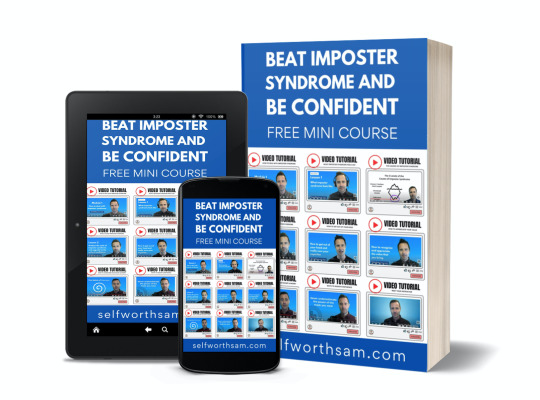
Dissolve Imposter Syndrome Today and Future-Proof Your Professional Growth. Book an appointment.
Need a speaker for your podcast, meeting or event to talk about Imposter Syndrome? Download my press kit
#architectural#architecture#design#architect#architecturephotography#architecturelovers#interiordesign#architecturedesign#Youtube
0 notes
Text
The Most Boring Article About Imposter Syndrome You'll Ever Read
Author: Self Worth Sam, Imposter Syndrome Expert

If Elon Musk can create a boring company, I can write a boring blog article on imposter syndrome. Boring: to make a hole in something with a tool or by digging.
Help others going through imposter syndrome too by sharing this article.
Just as Elon Musk started The Boring Company to dig a hole from L.A. to Vegas and build a new transportation system, so too can you create a transportation system from your conscious mind to your unconscious mind, access the missing information about imposter syndrome and neutralize it for good.

Imposter syndrome for many people is stuck somewhere deep down inside their mind and they don’t know how to get to it, nor dig it out. However, by boring down into your mind, you can remove it. In this article Self Worth Sam will share with you a way to bore imposter syndrome out once and for all.
As much as it might be an interesting experiment to see if your imposter syndrome could be removed via being uninteresting, I think it would prove useless. However, by introspection and reflective thinking you can “bore” and “tunnel” down into the depths of your mind to extract imposter syndrome.
Just as Elon Musk started The Boring Company to dig a hole from L.A. to Vegas (an excellent idea in my opinion be it that I’ve live in Burbank, and as much as I love Bob Hope Airport, I would welcome new ways to avoid the TSA experience).. sorry, tangent… Just as Elon Musk started The Boring Company to dig a hole from L.A. to Vegas and build a new transportation system so that you can create a transportation system from your conscious mind to your unconscious mind, access the missing information about imposter syndrome and neutralize it for good.
The new transportation system is built upon The Demartini Method - a series of questions that awaken you to true mindfulness, authenticity and love and appreciation of yourself.

Firstly, identify the specific trait, action or inaction that you dislike or despise most about yourself. In the case of imposter syndrome it might be that you don’t like that you give people the impression that you’re more competent than you really are, or that you avoid evaluations and have a dread of others evaluating you, or it’s hard for you to accept compliments or praise about your intelligence or accomplishments.
Next, list twenty (yes twenty) specific times when you remember yourself behaving this way.
Next, for each of those twenty moments, list the ways that trait, action or inaction of imposter syndrome was a benefit or service to you.
Next, for each of those twenty moments, list the ways that trait, action or inaction of imposter syndrome was a benefit or service to people who perceived you in that moment.
Next, recall an equal amount of moments where you remember yourself acting in the exact opposite way to those same people.
Now comes the real boring bit.
Next, think of all those 20 moments (one by one) when you were perceiving yourself to be an imposter, and think of the people who were in your space at that exact same moment, and list the people who displayed the exact opposite trait, action or inaction TO THE EXACT THE SAME PEOPLE at that exact same time.
And lastly, think of those 20 moments, one by one, where you perceived yourself to be an imposter, and list the drawbacks to you and others who were there, if at the exact same moment, you did the exact opposite behaviour, e.g. were authentic, overly confident, or narcissistic.
This will recalibrate your perceptions, if you do it thoroughly.
And this is just one beginning of your transformation (and the Demartini Method).
Want to take the next step to beat Imposter Syndrome and be confident? Take my free online course
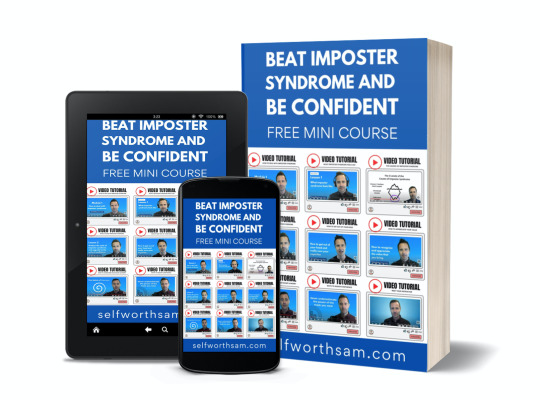
Dissolve Imposter Syndrome Today and Future-Proof Your Professional Growth. Book an appointment.
Need a speaker for your podcast, meeting or event to talk about Imposter Syndrome? Download my press kit

#Entrepreneurship#Personaldevelopment#Education#Money#Investing#Motivation#Selfhelp#Whatinspiresme#Personalbranding#Businessintelligence
0 notes
Text
Some Feel-Good News About Imposter Syndrome to Brighten Your Day for New Professionals

Author: Self Worth Sam, Imposter Syndrome Expert
Everyone experiences imposter syndrome. Even the most senior and experienced in your field. Yep, believe it.
Imposter syndrome training should be part of induction day when you’re starting a new profession or job. However, most managers don’t know what it is, nor if their staff experience it, and they even experience themselves. A little conversation about imposter syndrome when starting your new profession could make a big difference in reducing your anxiety, self-doubt and instead, make you aware of the value that you bring, even though you might perceive yourself to be “new”. In this article Self Worth Sam will share with you Some Feel-Good News About Imposter Syndrome to Brighten Your Day for New Professionals.
I’ve been there a handful of times. New jobs, new people, new policies and procedures, new coffee room etiquette, and new territory in which you must find your feet, or sink into the psychological condition known as imposter syndrome. Take a breath, I got some feel-good news for you.
You’ve probably had a partner, a friend, colleague or professor tell you, “you’ll be fine.” However, it’s Monday and it’s day one of your new job in your new profession, and you do not feel fine. You feel far from fine. You feel terrified that your new peers, whom are much more experienced than you, are going to corner you in the coffee room, point their fingers at you and chant, imposter, imposter, imposter! Then you’ll run, hide and cry because your worst nightmare came true.

Hang on, where’s the feel-good bright bit?
Right here.
Pay attention. That fantasy in your head simply isn’t going to happen. Snap out it, pour yourself a red wine or cognac, allow your central nervous system to stabilize, and know this:
Everyone experiences imposter syndrome. EV-VER-REE-ONNNNNNNNE. Got it? I’ll say it again, in case it didn’t register. EEEEVVVVVVVVVVVEEEERRRRRREEEEEEEEEEEEEEEEEEEEEEE—----EEEEEEEEEEE
ONE.
Everyone.
Everyone experiences imposter syndrome. Even the most senior and experienced in your field. Yep, believe it. I’ve been in new jobs where I was the new guy and felt like an imposter, and I’ve been in jobs the longest and still had days of feeling out of my depth. It’s ridiculous. It’s a bit of a joke really. Especially since hardly any one talks about it.
One of the best ways to reduce about 80% of imposter syndrome’s impact on you is to make one friend on day one of your new job and ask, do your ever go through imposter syndrome and self-doubt about being a professional, despite training, accolades, experience and the fact that the hiring team thought you could the job?
That one question will work wonders for your blood pressure, plus you’ll make friends faster at work. And ironically, believe it or not, it will promote you faster too, for the fact that people talk. That person you asked ‘if they experience imposter syndrome’ will quite likely talk to HR or a team leader and say something to the effect of, “hey that new girl / guy is ok talking about and bringing up something that everyone here can benefit from.”
So really, your imposter syndrome has incredible benefits to you, if you just bring it up with a couple of people on day one. Go on, do it. Because remember… eeevvvv-eeerrrreeeee—-one!
Everyone goes through it.
Why not set the tone, and activate your authentic leadership, day one.
Take my free online course: How to Beat Imposter Syndrome and Be Confident
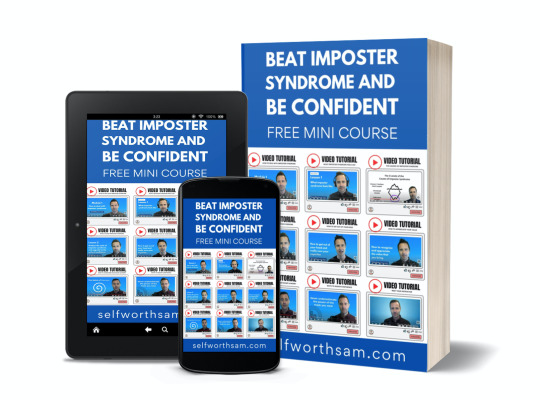
#Entrepreneurship#Personaldevelopment#Education#Money#Investing#Motivation#Selfhelp#Whatinspiresme#Personalbranding#Businessintelligence
1 note
·
View note
